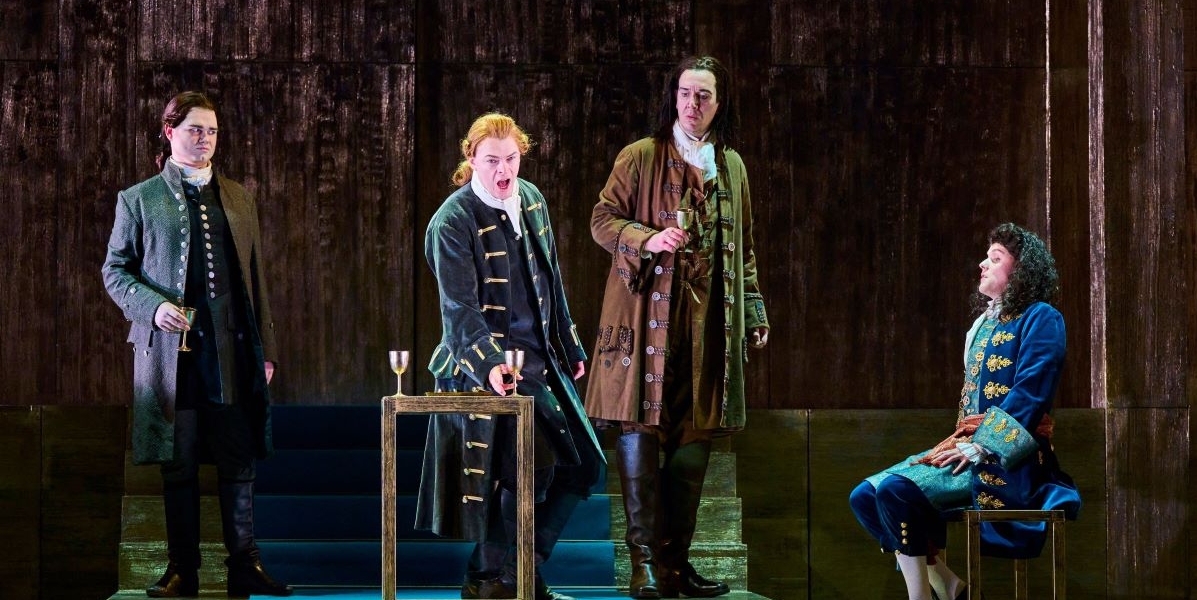While there would doubtless be much dispute over which is Handel’s greatest opera, ‘Julius Caesar in Egypt’ can certainly lay claim to being the most characteristic, highlighting all the most notable features of his artistic achievement in this genre. Refreshingly free of complicated plot, this is a study of development of a tightly-knit group of characters, through one golden aria after another exploring their dilemmas and impossible choices in music of incomparable variety of mood and sonic framing.
Director James Conway has chosen to set the opera in the time it was written – 1724 – which allows him to bring into play the rivalry between Britain and France to parallel the rivalry between the Romans and Egyptians in the opera setting. Just as the British saw themselves as successors – at least in aspiration – to the conquests and cultural achievements of the Roman Empire, so the Egyptians are painted, like the French, as the epitome of effete cultural exoticism, both a pit of decadence and the acme of allure. Unusually for this era it is an opera not about achieving military victory but – rather – how to handle its spoils and manage a newly conquered but unsubdued set of opponents.
The clear focus of the director carries through into a very effective staging. A minimalist set, shaped out of natural wood grain, the creation of designer Cordelia Chisholm, provides plentiful doors for flexible entries and exits, so important in giving flow to the many numbers in this work, together with a flight of steps and an inner proscenium to frame triumphal or showpiece moments – most notably a startlingly anachronistic but witty vision of Cleopatra as the Virgin Mary, speaking to contemporary eighteenth-century English anti-Catholicism. The wow factor is provided by the superbly decorative costumes of the principals, with the Egyptians mirroring the fashions of Louis XV’s France, contrasting the more sober-suited Romans. There are some exquisite lighting effects at key points by lighting designer Mark Howland, which respond subtly the variations and shifts in mood within the stylised repeats of the manifold ‘da capo’ arias.
This is an opera where the bulk of the action and reaction happens around the title role, rather than instigated by him. This makes Caesar a somewhat difficult role to play. Francis Gush certainly looks and acts the heroic part with true conviction, but at points his singing did not carry or project across the vast space of the Hackney Empire, and the effort took a toll on his intonation. As the wily Cleopatra, Susanna Hurrell was pitch perfect in every sense. This was a delectable performance, ranging from raunchy teasing through to plangent despair, delivered with supreme confidence and command. As her debauched brother, Tolomeo, Alexander Chance was equally impressive, finding many wry, sardonic comic moments on top of a confident technical display.
The roles of Cornelia and her son Sesto are in many ways harder to bring off: they spend much of the opera in mourning and demanding revenge, and only towards the end do their characters move forward and develop a fresh emotional register. But both Carolyn Dobbin and Margo Arsane found ways of identifying gradations and nuances within lamentation and despair, with exquisite control of tone and colour and won repeated approval from the audience. As the single bass voice, Edward Hawkins, provided contrasting colour and acted powerfully as the rough-hewn general, Achilla, who is essential in driving the plot forward, as far as it goes.
The orchestra was The Old Street Band under regular ETO conductor Sergey Rybin. Given that this band is made up of freelance period-instrument specialists gathered together for particular productions, it was impressive how well they adopted a collective drive and ensemble, while leaving space for some delectable solos along the way. Rybin set a brisk pace on the whole, which this music really needs, but was always able to find room to give his singers space to accommodate complicated acting gestures or elaborate cadenzas.
This production deserves to be seen while it tours the country throughout the Spring. It will bring great pleasure to devotees of the counter-tenor voice (four roles in all), to those who savour the multi-layered aesthetic rewards of Handel’s operative world, and to anyone who is yet to be convinced that Baroque opera can be made to work as compelling narrative and drama.

